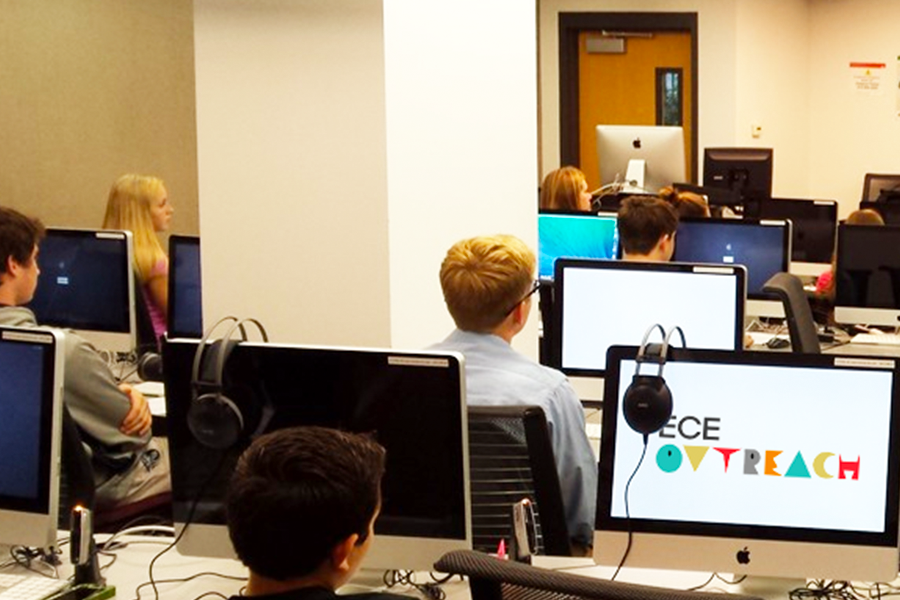
SPARK Saturdays
The best way to learn is by teaching—or at least, that’s part of the thinking behind the Department of Electrical and Computer Engineering’s outreach program. And of the many ECE Outreach programs led by students in the department, none demonstrates this more clearly than SPARK Saturdays, created to introduce high school students to the field of electrical and computer engineering and expose them to engineering as a potential career choice.
This year’s SPARK Saturdays program consisted of five separate labs held between February and May, each designed to introduce a different concept of electrical and computer engineering: Boolean logic, programming, smart lights, radio, and energy harvesting.
But not all teaching is created equal, and when it comes to the hands-on subject matter of ECE, a simple lecture and a slideshow won’t do.
“When I was in high school, I attended an Introduction to Engineering class at my local university,” says ECE student Maddison Scott, co-president of SPARK Saturdays, “but the class was nothing more than sitting through boring PowerPoints of statistics about jobs in engineering fields. Through SPARK Saturdays, we want to give the students a real introduction to ECE, and to foster a real interest in the field.”
Armed with a passion for hands-on learning, Scott, along with fellow co-president Paola Aguilar, began volunteering with SPARK Saturdays. As a program designed and run by ECE students, it is a chance for students in the College to not only reach out to high school students in the community but also to apply the concepts they’ve been learning in their classes in new, hands-on ways.
Each lab takes place over the course of two hours. Volunteers provide attendants with an overview of the concept—such as circuit building or programming—then guide them through a hands-on project, which allows them to apply what they’ve learned. In the Smart Lights workshop, students build night-lights that can sense environmental light. In the radio workshop, they build a working radio that can be tuned by switching out capacitors.
As opposed to the usual four sessions, this year included a brand-new fifth lab, the Energy Harvesting Lab, designed to teach students how to build remote-controlled devices powered wirelessly by harvesting the energy they need to run. This event, held April 23rd in Hamerschlag Hall, was designed by ECE graduate student Alexei Colin to teach students about capacitors, energy, and radio waves through the building of circuits that gradually increase in difficulty. The lab culminated in students building a battery-free energy harvesting circuit that gathered energy from radio waves.
“The students were enthralled by the idea of powering a circuit without a battery,” says Aguilar. “The different circuit stages required students to use buzzers and LEDs to give feedback about the capacitor’s current charge, and many students found this very entertaining. It feels more hands-on than the digital
Though for the organizers of SPARK Saturdays, the program is about more than teaching: it’s about making sure that the whole of the Pittsburgh community, no matter what their economic situation, has an equal chance to learn about engineering as a potential career path.
“Although we welcome any student who wants to learn about ECE, we strive to reach out to students from schools that lack the resources or time to incorporate engineering into their curriculum,” says Aguilar. “In our society, we are asked at a young age to select the path of study that will likely define the rest of our careers. It is very important for high school students to be well-informed about the career choices out there. There are also a lot of students with potential that might not even consider engineering. We strive to expose them to it.”
The ECE Outreach team would like to thank faculty advisor Tom Sullivan, student activities advisor Katie Costa, and the numerous dedicated volunteers whose passion helps the program to continue.
Story originally published here.